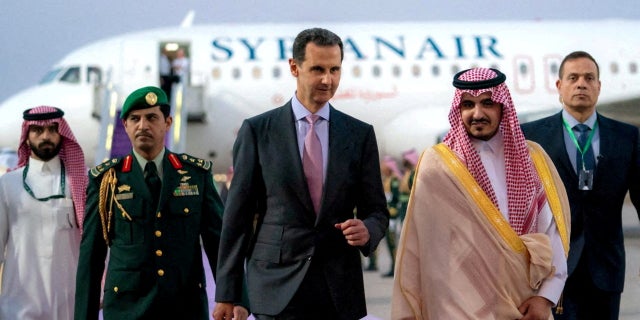Syrian President Bashar Assad appeared at an Arab League summit in Saudi Arabia for the first time in more than a decade Friday after his country was expelled in 2011 for its brutal crackdown on peaceful pro-democracy protests during the Arab Spring.
Assad was welcomed back into the fold as part of a reintegration effort on behalf of several regional states, led largely in part by Saudi Arabia and the United Arab Emirates (UAE).
The Biden administration and top White House officials have condemned the move, vowing to continue its policy of keeping Syria an international pariah and continuing to hold Assad accountable for his role in the deaths of hundreds of thousands of Syrians in the country’s more than a decade-long civil war.
One Syria expert told Fox News Digital the Biden administration has been sending mixed messages on its Syria policy in the last several years. The Washington Post quoted a senior Biden administration official in October 2021 who said it did not support Jordan initiating normalization after King Abdullah II spoke with Assad via phone. However, the official said the Biden administration will no longer actively work to stop countries from engaging with Assad, except when the law specifically requires it.
Charles Lister, a senior fellow at the Middle East Institute, said the White House has been giving regional states a sort of yellow light to pursue normalization talks with Damascus while the State Department publicly holds a different position.
“The State Department has consistently been opposed to normalization and supportive of isolation, of sanctions, of punitive actions and what have you. But when you have a government, and particularly the most powerful government in the world, sending such mixed messages, it is no surprise that that has resulted in a completely useless, contradictory policy that ultimately has led us to where we are right now, which is some states in the region attempting to re-engage with the regime, but in so doing, unfortunately, from a U.S. perspective, as an American, they have completely destroyed our leverage,” he explained.
THE NUMBER OF REFUGEES FROM SYRIA TOPS 2 MILLION; NEARLY 5,000 A DAY FLEE ACROSS BORDERS
“If we ever were to choose to try to push Syria-related diplomacy, they’ve killed our leverage because ultimately Bashar al-Assad knows now that he has managed to coerce regional states into effectively capitulating to him. And so, if we as the United States were to ever step up and say, ‘Right, time to finally deal with the Syrian crisis, let us launch a major diplomatic process’ – the region has already stepped five steps down that ladder and given the regime a great deal more influence and leverage over that process than they had before.”
Crown Prince Mohammed bin Salman meets with Syria’s President Bashar Assad, in Jeddah, Saudi Arabia, May 19, 2023. (Syrian Presidency/Handout via Reuters)
The Arab League’s consensus decision to welcome the Syrian dictator back has felt like a slap in the face to Syrians forced to flee their homes due to barrel bombings from regime forces and shelling from Russian warplanes.
More than 14 million Syrians have been forced to flee their homes and nearly 7 million are internally displaced.
Khalid al-Shallah, a Syrian living in northwest Idlib province, told Fox News Digital, “We refuse normalization with the regime of Assad, and we cannot reconcile [and] have him as our president.” He added, “A criminal terrorist regime has displaced millions of Syrian families to different countries around the world and arrested hundreds of thousands in its prisons, and we do not know their fate.”
Al-Shallah and his family fled their home in Maarat al-Numan in 2019 due to constant shelling. He and his family were displaced for several years before moving into an apartment near the Turkey-Syria border.
He shared that despite the hunger and displacement his family experiences, they would rather continue to suffer than reconcile with the regime. “Bashar al-Assad is a war criminal, the killer of children, the biggest terrorist, the head of drug gangs. We are his people and we know him,” he said.
US HAS ENGAGED ‘DIRECTLY’ WITH SYRIAN OFFICIALS ABOUT FREEING AUSTIN TICE: STATE DEPARTMENT
The Saudi-led push for re-engagement with the Syrian regime has been described as conditional by Arab governments.
Lister told Fox News Digital that regional states such as Jordan and the UAE were largely inclined to push forward with normalization in an effort to get Syria to address issues they say are affecting their own countries.

Syria’s President Bashar Assad arrives in Jeddah, to attend the Arab League summit in Saudi Arabia, May 18, 2023. (Sana/Handout via Reuters)